New and Novel: Repurposing Restaurant Space During the Pandemic
The scene is a familiar one. A row of storefronts on a previously thriving street, doors and windows now shuttered. Lights dim, shops and restaurants on a skeleton staff, or closed altogether. Handwritten signs in the windows promising a quick return or saying a fond farewell. While these troubling images are often used to illustrate the economic effects of the pandemic in the news, there’s a more hopeful story unfolding if you scratch the surface and look deeper.
Rather than accepting the conditions of intermittent lockdowns, small businesses are finding new ways to operate, and restaurants are no exception. Many are offering expanded takeout, pick-up, and delivery services, a natural pivot for eateries. But other restaurateurs are seeing a chance to get creative, finding some truly innovative, out-of-the box ideas for an alternative revenue stream.
A Total 180: Legal Tenders Pop-Up at The Shameful Tiki
Alana Nogueda knows a thing or two about having to pivot. After temporarily closing her Toronto-based bar, The Shameful Tiki Room, in March 2020 during the initial wave of shutdowns, she quickly moved to offering DIY cocktail kits. But after a brief reprieve over the summer and fall when restaurants could operate at partial capacity, it soon became evident that with rising COVID-19 case numbers and cooler weather moving in, she’d need an alternate stream of income to survive. While The Shameful Tiki offers a limited menu, takeout was never a significant source of revenue at the establishment.
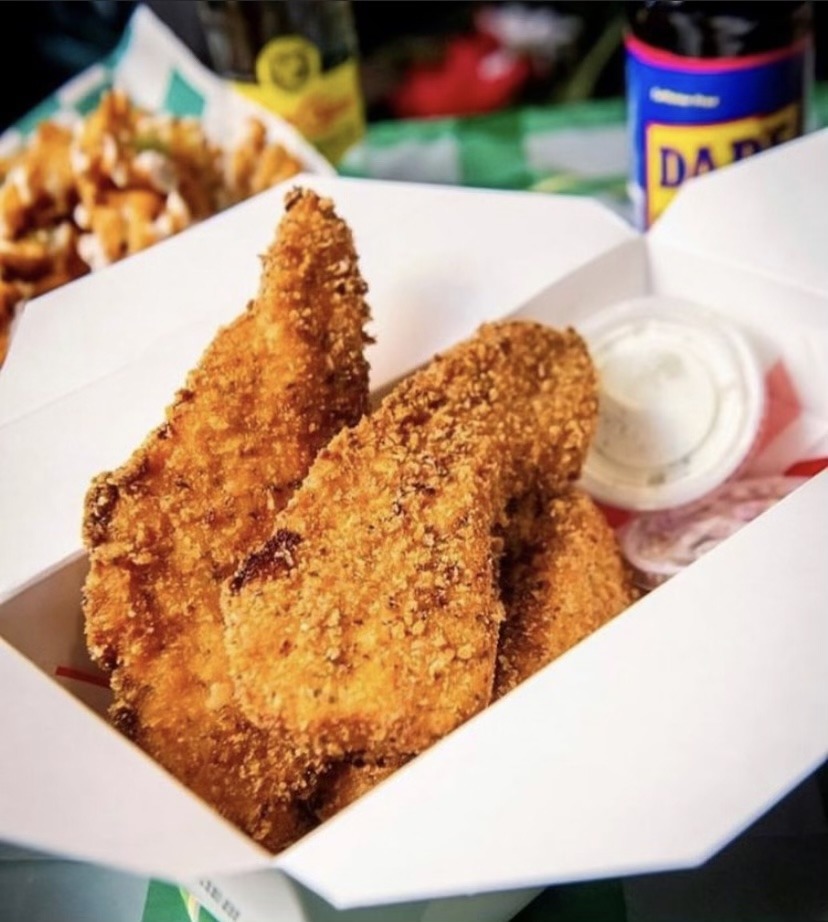
It was her partner Aviva Rosnick who came up with the idea for a nostalgic, throwback-to-your-childhood take on chicken fingers, paired with coleslaw, sauces made in-house, and cocktails to-go. A bartender by trade, Nogueda encountered a learning curve to transition her operations to takeout comfort food, but she was up for the challenge.
“We just figured it out as we went along,” she says. After experimenting with different recipes and asking their friends and family to help taste-test, Legal Tenders was born, less than a month from when Rosnick first pitched the idea. They used social media to get the word out, but an unexpected assist from Jason Momoa—who was spotted picking up an order—helped boost their profile and their business. The concept currently operates as a pop-up, from Wednesday to Sunday, out of The Shameful Tiki’s restaurant space.
“I love bartending. That’s what I do. Never did I think I’d be in the kitchen, slinging chicken,” admits Nogueda. But her and Rosnick’s quick thinking and speedy execution have given her Parkdale business another lifeline during the months of lockdown in Toronto.
A Natural Transition: Flossie’s creative repurposing of a space
Four years ago, Kyle Jones gave up his steady, well-paying job to take a considerable risk— buying a food truck and moving to the countryside to start his own sandwich business. With hard work and a lot of patience, Flossie’s Sandwiches gained a local following and attracted tourists visiting the Prince Edward County area. Then COVID-19 hit.
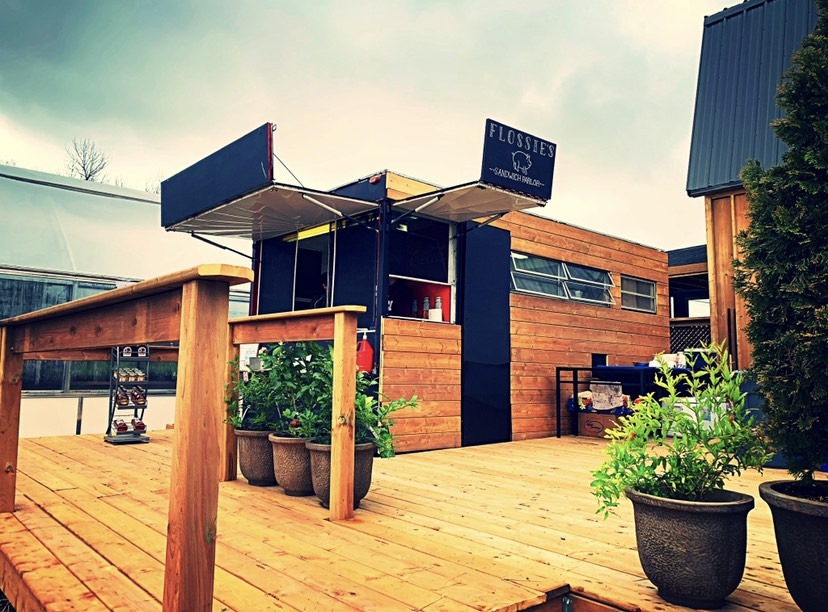
“The food truck business is tough in the winter, even without the pandemic,” says Jones. This time, it was worse. Even his usual catering gigs were drying up due to restrictions and fewer celebrations taking place.
Jones operates outdoors at Carson’s Garden + Market. Flossie’s has a family-friendly deck area with seating and a green patch for kids to play. This open-air arrangement was ideal for the summer months of 2020 when dining guidelines were in flux, but it wouldn’t work for cold weather. Jones and Carson Arthur, owners of Carson’s Garden + Market, landed on a great solution—bringing Flossie’s indoors for the winter months. The seasonal reduction in inventory within the greenhouse meant there was space for a mini-cafe, and the natural light and warmth in the facility was perfect for patrons looking to chase away the winter chill.
Although the greenhouse did not have conventional kitchen facilities, Jones saw an opportunity. Cooking with a couple of griddles, he streamlined his menu to make efficient work out of preparing sandwiches and soup. With spring on the horizon and the greenhouse restocked for the 2021 growing season, Jones has closed up and plans to move back into the outdoor space. The shift indoors opened a path for him to continue to run his business in a cost-efficient manner while providing an invaluable opportunity to test-run his operations in a different setting.
Expanding your reach: Partners with benefits
Restaurant owners are realizing that while dine-in capacity may be limited for some time to come, customer interest is still there. The challenge? Finding new ways to meet that demand in a scalable, COVID-19 guideline-compliant manner. One of the first innovations to come out of the pandemic last spring was the restaurant meal kit.
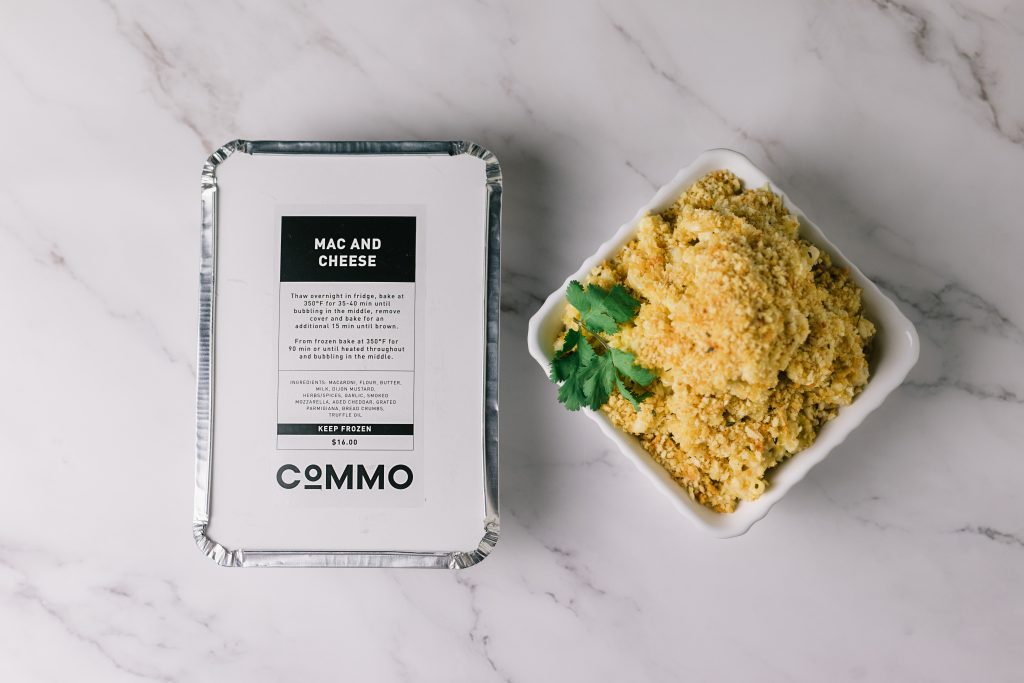
Instead of picking up a ready-made meal, the kit contains all of the ingredients you need to recreate your favourite restaurant dish at home. Recognizing that not everyone has the time, interest, or skill to use a meal box on a regular basis, the founders of CoMMO (which stands for a Community of Menus and Meals Online) have found a different approach.
“People are tired of cooking, but takeout and delivery costs can be exorbitant as well,” says Michael Sullivan, CoMMO’s culinary director. Sharing a space with Betty’s pub in downtown Toronto, CoMMO partners with community chefs, providing them with the facilities to make and offer frozen restaurant-quality entrees.
Sullivan and his team invested in equipment that allows the participating chefs to cook, process, and pack their meals for freezing using the kitchen at Betty’s. The result? Customers can pick up hot takeout for their evening meal and grab a few frozen entrees—along with a bottle of wine or a few craft beers—for the week ahead.
Nurturing new businesses: Join forces to sublet space and bolster businesses
Borrowing an idea from the tech industry, the founders of Ration Food Lab took the idea of a shared kitchen one step further and turned the restaurant space at the Beverley Hotel into an incubator. Currently home to four burgeoning new brands that offer takeout and delivery, the objective is to kickstart each of these brands into self-sufficiency.
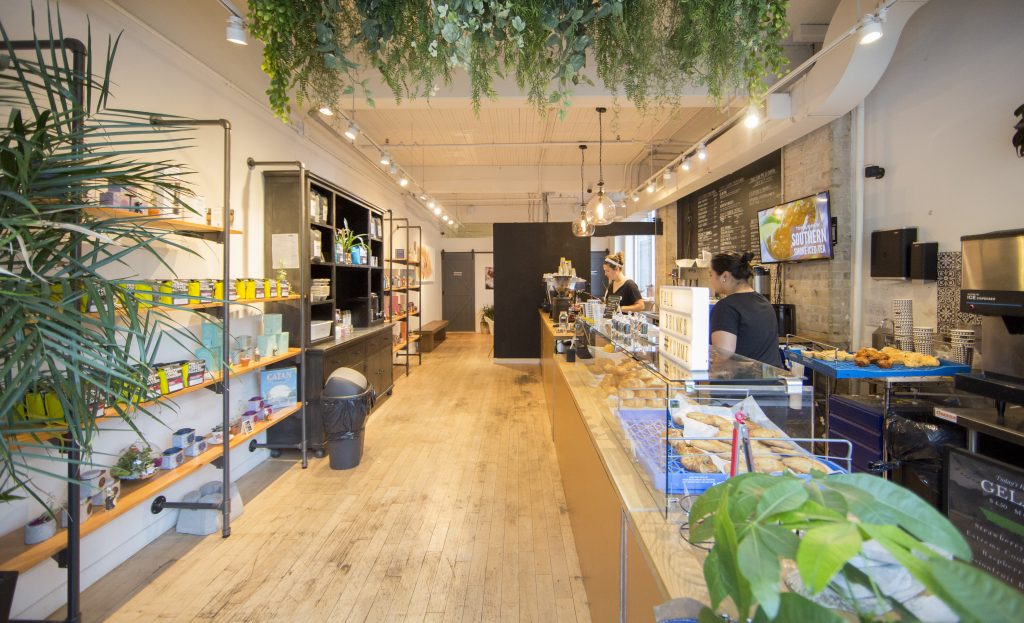
“We try to take some of the risks out of starting a new restaurant,” says Chris Nguyen of Ration Food Lab. Overhead costs are shared between the participants, and the more experienced chefs provide advice and guidance to those who are newer to the business. The Beverley Hotel restaurant currently hosts Ration Burger, an offshoot of Ration Food Lab’s usual operations, Beverley Pasta, ChickMagnet, and Letterbox Donuts.
Nguyen is also the owner of Strange Love Coffee, an independent cafe with four locations across Toronto. He currently sublets space from one of his shops to k.Dumps, a specialty pop-up with a fresh take on traditional Asian dumplings run by Chef Ken Yau. With office workers staying home and non-essential businesses closed, foot traffic is way down, and his coffee business has taken a significant hit—a reduction of close to 80 per cent. The benefits of subletting are twofold: it opens up another source of income while helping him support a startup in the industry.
When COVID first hit last spring, it was like a wake-up call to many of the people who work in hospitality. They had to consider whether staying in the industry was worth it for them. As a result, those who are choosing to stick it out are the ones who believe that the future is full of potential.
Chris Nguyen Ration Food Lab, Toronto
Buying, selling and everything in between
Despite the current situation, some prospective restaurant owners see the current downturn in the industry as an opportunity to get in. With the number of permanent closures that have occurred over the past year, some see it as a chance to secure a spot in a prime location that would have been out of reach in an average year. And those who are established and able to weather the risk are looking into expansion.
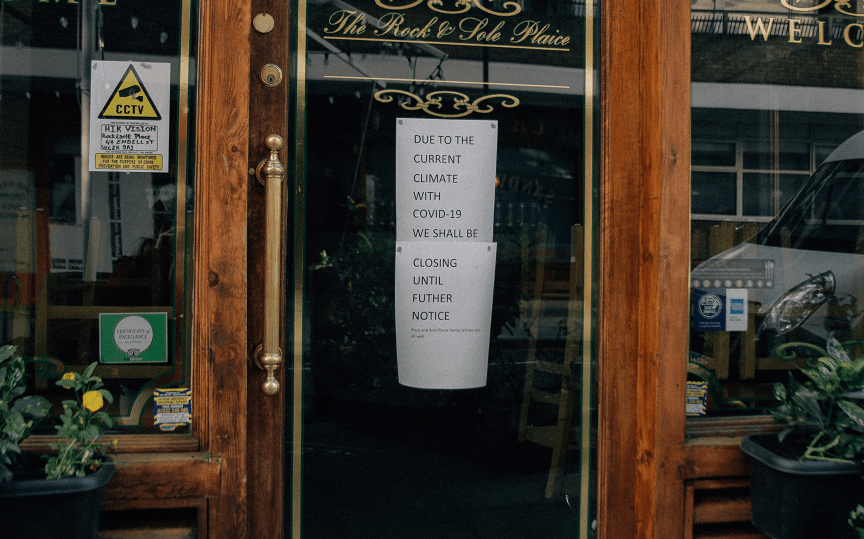
“They see it as an investment,” says Stephen Murphy, the principal director of OMG Real Estate, a firm that specializes in restaurant real estate. “They see what’s happening with COVID-19 as a temporary situation and scoring a bargain that helps set them up for future success.”
Perhaps surprisingly, 2020 has been one of the busiest years for his company, with higher than usual buying and selling activity. While Murphy believes that the effects of COVID-19 will continue to pose a challenge to most restaurateurs in 2021, he’s optimistic for an upturn beyond that.
A bright future
Nguyen agrees with the positive outlook. “When COVID first hit last spring, it was like a wakeup call to many of the people who work in hospitality,” he says. “They had to consider whether staying in the industry was worth it for them. As a result, those who are choosing to stick it out are the ones who believe that the future is full of potential.”
Indeed, Nogueda, Jones, and Sullivan have all brought up plans for growth and expansion at their respective businesses, expressing hope for the years ahead. With so many stories of resilience and innovation in the industry over the past year, Nguyen’s confidence seems well-placed. “Personally,” he says, “I think things will come back stronger than ever.”









